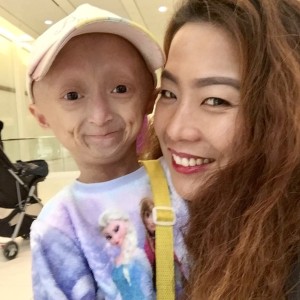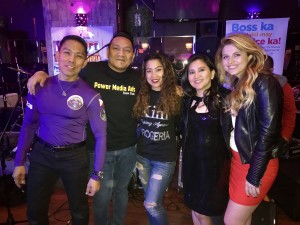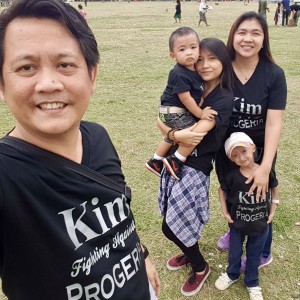Fil-Ams help Filipino kids with rare aging disease get to Boston for clinical trials

Ten-year-old progeria child Kim Asis and DJ Chinita, both are PMF ambassadors for progeria kids in the Philippines. INQUIRER/Elton Lugay
NEW YORK—Kim Asis is only 10 years old, but she has the appearance of an octogenarian due to progeria, a premature aging disease affecting about 200 children worldwide. She was able to come to the United States for clinical trials in Boston and is now back in Manila, all thanks to a group of Filipino Americans.
Five of the 200 progeria kids throughout the world are Filipino. (There had been six, including Rochelle Pondare, who died last year.) They suffer from this extremely rare genetic disorder also known as Hutchinson-Gilford progeria syndrome or HGPS. The disease affects both sexes and all races equally at a rate of about one in every four million births worldwide
Last month, a group of Fil-Ams in Queens, New York—led by DJ Chinita, a radio broadcaster, and Raffy Ronas of Power Media Ads—linked up with Project Michelangelo Foundation (PMF), the first and only U.S.-based Filipino organization that raises awareness and funds for children with progeria.
According to the Progeria Research Foundation, children afflicted with this disease are born seemingly healthy, but start aging dramatically by the age of two. On average, they die at 13, although some live up to 20 years. Pondare lived past 13 but died shortly after celebrating her 18th birthday.

Founder Jojo Sayson (left) and Dr. Imelda Banting (in black dress) of Illinois-based Project Michelangelo Foundation with New York organizers of the Progeria benefit show. INQUIRER/Elton Lugay
HGPS is caused by a gene mutation and is characterized by accelerated aging in children. Symptoms resembling aspects of aging are manifested at a very early age.
“Progerin is normally produced as we age but it’s produced in excessive quantities [in children with progeria], so they age rapidly [at a rate of] about seven or eight years [for every year]. The child never really grows tall because their bones become mature at an early age. Their condition is like that of the elderly,” Jojo Sayson, co-founder and president of the Bourbonnais, Illinois-based PMF, told INQUIRER.net.
Sayson organized PMF after being bilked of PhP500,000 (USD $12,500) seven years ago by a group of bogus grass-root organizers in the Philippines. He said he was asked to donate money for poor Filipino children, but the organizers pocketed the money instead.
“We were supposed to build a school for Aeta children,” Sayson said. “I delivered the funds from the various fundraising activities that I initiated around 2010 in Chicago. I lost all that. The money did not go to the children. They made receipts of the payment for many other activities,which were not related to children. I was disappointed. From that disappointment, I prayed to the Lord that He would give me a sign. Filipinos are inherently very spiritual, and I held on to the faith that God would show the way.”
Sayson was contacted through Facebook, where his public profile shows him dressed up as a superhero of the Philippines.
“I was once featured on TV as the Filipino superhero back in 2006. I started seeing children in 1996 wearing a Batman outfit and in the Philippines, I wore a Superman outfit for 21 years,” he said.
Why wear superhero outfits?
“It’s empowerment for me,” he replied. “When I was a child, I was also bullied. I always read superhero comics and realized that it’s empowering for a child that a superhero would come to you and say everything’s going to be okay and that I believe in you. I prayed as a child that a superhero would come to see me. No superhero arrived. Many years later, [I realized] I was that superhero.”
It was during one of these superhero outings that he met Raochelle Pondare, who inspired him to start PMF. Aside from helping children with progeria, the foundation aims to reach other children with terminal illnesses, destitute orphans and those who are abused.
“Most people would wait with an excuse, saying I’ll help people when I have money or when I get rich. You cannot wait; so the paradigm I’m thinking of is for everyone to ignite the human potential. Today is the day because tomorrow you may not be here anymore. So from being somewhat embezzled, I’m now pushing for integrity—that as a human being, the only things you can take with you when you die are your integrity and your memories,” Sayson said.
For her part, DJ Chinita first heard of progeria through a caller on her radio program.
“I got to know about progeria through Dr. Imelda Cruz, vice president of PMF,” she told INQUIRER.net. “She called in and asked me to play her composition, ‘Friendzone’ dedicated to the late Rochelle and the kids. I’m a very tough woman but for some reason when I heard the song, I got weak on my knees and became emotional. I then asked her if there’s something else I could do to get involved in their work.”

Kim Asis’ parents Dennis and Melanie and siblings Isay, 16, and 20-month-old Ice in the Philippines. CONTRIBUTED
Last February 25, Chinita and her media colleague Ronas raised about $5,000 through a show at D’ Haven, a popular Filipino nightclub in Queens.
Ronas said 100 percent of the proceeds would go to Asis and her fellow progeria sufferers. “The money will be used specifically for the kids’ round-trip air transportation from Manila to Boston for their clinical trials as well as board and lodging and other on-ground accommodation expenses during their stay in the U.S,” he said.
Sayson said Asis stopped by New York before going to Boston last January to get treatment.
“I was crying the whole time when I first met Kim,” Chinita recalled. “My mind went blank, there were no words coming out of my mouth.”
But Asis was full of energy in fighting the disease. Chinita took the child to Rockefeller Center for a quick tour and at one point “I held her in my lap and touched her back, her bones were protruding and she’s only 10.”
Although Asis was not in pain at the time, Sayson cautioned people around her to be extra careful as “you don’t want them to fall because their bones are very brittle and fragile as they age rapidly.”
What medication are the kids taking?
“Lonafarnib—it helps with the collagen which is what makes up the blood vessel. If the small blood vessels become stiff, their usual cause of demise would be a heart attack or brain hemorrhage because the blood vessels cannot expand or close anymore. So this is designed to get them loose and less fragile. The results have been good so far,” Sayson said.
The objective is to prolong the life of the progeria kid.
“The other medication is called Everolimus, another drug that is supposedly better, but is only available through the clinical trial. PMF facilitates its accessibility to the kids as the medicine comes from Boston Children’s Hospital,” he added
Sayson said the five remaining Filipino children with progeria are based in Luzon.
“We found them and we decided we would be their protectors—it means that whenever people come to them, we prevent them from being exploited ‘cause so many people have tried exploiting our first one (Pondera) using their image or presence for other reasons. They benefited from it financially but nothing went to the child.”
At the moment, PMF is seeking more donors to help bring two more patients to Boston. “We’re helping them prepare to get the clinical trials at Boston Children’s Hospital.”
[For information on how to help or donate to children with progeria in the Philippines, please contact Jojo Sayson through the PMF website, projectmichelangelo.org or by phone at (815) 936-1992. Interested donors may also call DJ Chinita at (347) 607-6279.]

